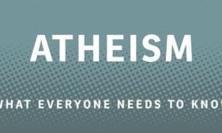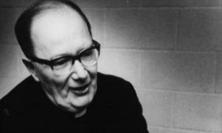Is the line between theism and atheism as clear as we might think? Should we even be setting these two value systems against one another? A.C. Grayling, for example, would prefer us to talk about naturalism and supernaturalism, but even that distinction leaves us with a multitude of questions to explore… and a new book from one of Heythrop College’s philosophers does just that. Bertrand Russell wrote about why he was not a Christian; now Fiona Ellis tells us why she is not an atheist.
A.C. Grayling claims that ‘[i]t is time to put to rest the mistakes and assumptions that lie behind a phrase used by some religious people when talking of those who are plain-spoken about their disbelief in any religious claims: the phrase “fundamental atheist”’ (‘Can an atheist be a fundamentalist?’). What, he asks, would a non-fundamentalist atheist be? Perhaps someone who believes ‘only somewhat that there are no supernatural entities in the universe…perhaps there is only part of a god (a divine foot, say, or a buttock)’, or doesn’t care that ‘other people hold profoundly false and primitive beliefs about the universe’, or can tolerate the ‘strummed guitars and saccharine smiles’ of Christians who’ve now jettisoned hell-fire, poverty and chastity. We seem to be leading up to the idea that there’s something unsavoury about non-fundamentalist atheists – they only go half hog and respond to the ‘horror’ of Christianity with a similar saccharine smile to those who sing about it with their guitars. But no, the claim is not that we should all become fundamentalist atheists, for the term ‘atheist’ invites debate on the ground of the theist. The right term to adopt, says Grayling, is ‘naturalist’, a naturalist being someone who ‘takes it that the universe is a natural realm, governed by nature’s laws’, and who believes that ‘there is nothing supernatural in the universe – no fairies or goblins, angels, demons, gods or goddesses’. So we should all become naturalists, and naturalists see things as they really are – none of the sentimental claptrap or saccharine smiles that come with profoundly false and primitive beliefs about the universe.
What are these false and primitive beliefs? Those which populate the universe with supernatural entities like fairies, goblins, angels, demons, gods or goddesses, we are to suppose. Who could take such things seriously? What of the idea that ‘there is a being somewhat like us…yet with the negation of such other of our failings as mortality, weakness, corporeality, visibility, limited knowledge and insight; and that this god magically impregnates a moral woman, who then gives birth to a special being who performs various prodigious feats before departing to heaven’? Again, it all sounds decidedly dodgy, particularly to one who has been convinced by the authorities that the universe is a natural realm, governed by nature’s laws, and that there is nothing supernatural in the universe. So how ought naturalists to respond to those people who hold such beliefs about the universe – should we care? Doesn’t it feel good to be in the enlightened minority? And what of Nietzsche’s claim that the falsity of a belief isn’t necessarily an objection to it?
No lack of problems
Enter the philosopher who appreciates the difficulties we face in tackling the question of the nature of the universe – one who, as Wittgenstein puts it, does not suffer from ‘a lack of problems’. The first question he will ask is: where does the boundary lie between naturalism and supernaturalism? It is, in fact, entirely unclear, as is the boundary between atheism and theism. We can see this by considering the contemporary philosophical debate. Many philosophers espouse naturalism, and although most of them accept that naturalism involves atheism, they disagree about what exactly naturalism amounts to otherwise. Grayling’s gloss – that the universe is a natural realm, governed by nature’s laws, and there is nothing supernatural in the universe – simply raises the question of where the limits of nature lie, and some answers involve reference to things which count as supernatural according to other conceptions of nature.
Take the idea that the scientist has the monopoly on reality; that, as Wilfrid Sellars once put it, ‘science is the measure of all things’. This gives an answer to the question about the limits of nature – ie. that nature is whatever is accessible to science; however, it raises further questions about the limits of science – physics for certain, chemistry and biology probably, the human sciences perhaps. Apart from this pressing difficulty, we then face the question of whether it is philosophically or scientifically acceptable to assign the limits of nature to science. It lacks scientific support, for no science shows that science monopolises reality. It is a philosophical claim and philosophically controversial. Thus John McDowell complains that: ‘scientism is a superstition, not a stance required by a proper respect for the achievements of the natural sciences’. He insists that we ‘discourag(e) this dazzlement by science’, which leads us to suppose that ‘genuine truth is restricted to what can be validated by [scientists’] methods’.
From the perspective of scientism, McDowell – who respects the findings of science and calls himself a naturalist – has succumbed to ‘supernaturalism’. He denies that the natural world is to be comprehended in purely scientific terms, and grants that it is partially ‘enchanted’ – not with fairies, but with value, and value is not ‘natural’ in the scientific sense.
Heaven on earth, or puppets on a string?
McDowell is one of several contemporary naturalists who grant a place to scientific investigation whilst allowing that there are non-scientific modes of enquiry – philosophy included – which have a rightful and essential place in our study of the natural world. The proponents of this position – which McDowell refers to as ‘naturalised platonism’ and I describe, after James Griffin, as ‘expansive naturalism’ – all emphasise its anti-scientistic, non-reductive dimension; but they insist also that the things we are seeking to comprehend – value, for example – do not need any world except the ordinary (natural) world. As Griffin puts it, ‘[a]n other-worldly realm of values just produces unnecessary problems about what it could possibly be and how we could learn about it’. This is the force of McDowell’s naturalised platonism: values have been rescued from Plato’s heaven and brought back down to earth. Heaven on earth, if you like, minus the theistic overtones.
This caveat is important because the typical expansive naturalist will have nothing to do with God, thinking we can explain what needs to be explained without introducing God. Those, like McDowell, who are prepared to leave room for God, still imply that we are concerned, at best, with an other-worldly realm which belongs within the region of darkness; and we know already that the typical naturalist takes this ‘region’ to be explanatorily redundant. He is therefore inclined to leave it out of the picture – a something about which nothing can be said is veering close to being a nothing, particularly if it has no explanatory value.
The theist, on the other hand, rejects the assumption that reference to God is explanatorily redundant; although, pace Grayling, he does not think that theism is tantamount to ‘refut[ing]the findings of physics, chemistry and the biological sciences’ so as to justify the alternative claim ‘that the universe was created, and is run, by supernatural beings’. At least, he does not if he is remotely sensible. He accepts the findings of modern science and, consequently, does not think that the universe is run by supernatural beings. It is governed by nature’s laws; and in any case, God is not a being amongst beings, not even those of the supernatural variety – if, indeed, we are clear about what this description really amounts to. The theist thinks that there is more to reality than what the scientist comprehends: it is God-involving; God is the creator of everything, but His role as creator is compatible with the idea that things – including things like ourselves – do their own thing. So the idea that God ‘runs’ things is not intended to imply that we – and everything else – are just puppets on a cosmic string, nor that God functions as any kind of coercive force. Equally, this is not intended to be an alternative to scientific explanation. On the contrary, we are concerned with a dimension of reality which has absolutely nothing to do with science and is therefore entirely compatible with its findings. In saying this, the sensible theist is challenging that other familiar fundamentalist atheist – Richard Dawkins: God’s existence or non-existence is precisely not a scientific fact about the universe, and the presence or absence of a ‘creative super-intelligence’ (to use Dawkins’ preferred and perhaps predictable vocabulary) is not ‘unequivocally a scientific question’.
False and primitive beliefs
It is becoming clear that I care tremendously about at least some of the false and primitive beliefs about the universe which are held by certain people. I care that there are people who think that the only real questions we can ask are scientific, that belief in God is false and primitive, and that we can talk about God in just the way that we talk about goblins, fairies, and indeed human beings (no, He doesn’t have buttocks or feet and he doesn’t look like Father Christmas or one’s favourite bank manager either). However, a caveat is in order here. I don’t particularly care about the millions of believers who address God as if He is a bearded man in the sky, not least because most of them are quite aware that He is no such thing – they are not quite as stupid as the fundamentalist atheists would have us believe, and they don’t tend to commit atrocities either. I care a bit more about those for whom God exists simply to dish out prizes and rewards, but that’s because I don’t particularly like people who treat God, or beings other than God, in self-serving terms. Most of all, however, I care about those non-believers who think that all believers think about God in these weird terms, and who clearly accept these terms themselves.
So what’s going on? How come there are people – intelligent people – who hold infantile beliefs about God, are convinced that believers are stupid, and have got so angry about it all that they are prepared to defend their stance using arguments which are, in a word, stupid? There are stupid, and indeed dangerous, people who are gunning for God – or, rather, a pernicious version of God which suits their particular purposes – but these people provide no justification for attacking God or those who believe in Him. Rather, we should be attacking those who use God’s name as an excuse for peddling their obnoxious – and false and primitive – visions of reality. Science may have expanded our knowledge and understanding of things – we have learnt the rules by which nature works, and there is no longer any need to view its workings as the acts of capricious gods or fairies or goblins – but again, this does nothing to undermine belief in God. It serves, at best, to undermine the beliefs of those who think that a theistic framework is a competitor to science. A theistic framework is undermined on the assumption that the scientist has the monopoly on reality, but this assumption is neither scientifically nor philosophically supported, and it threatens in any case to leave us with a conception of reality which is thin even by the standards of the typical, non-scientistic atheist.
Darkness into light
Grayling claims that the atheist should describe himself as a naturalist, the justification being that this alternative label challenges the theist’s terms of debate. However, what I have said already suggests that the limits and commitments of the naturalist position are unclear. What we can say is that its typical proponent has no inclination to view the natural world in God-involving terms – God belongs, at best, to the region of darkness. That claim is to be applauded at one level, for it rules out any suggestion that God is a mere part of the world and it captures the mystery at the heart of His being. Nevertheless, the theist believes also that God is revealed in the world and hence that there is the possibility of some light.
The sceptical responses are familiar enough, and we have already noted Grayling’s preferred take on the Christian version of this revelation: a being somewhat like us magically impregnates a moral woman, who then gives birth to a special being who performs various feats before departing to heaven. Magic? Heaven? Special beings? Who on earth could take such nonsense seriously? Bring on the Godless anti-metaphysicians with their cynical guffaws. They’ll set the record straight – the story of God did not happen.
That conclusion is compelling enough on the assumption that nature is all there is and is to be comprehended in non-God-involving terms. However, these terms can be contested. Likewise, we can question the assumption that the introduction of God is a matter of superimposing upon nature a competitor cause who interferes with the natural run of events with the wave of a celestial magic wand. Why? Because it turns God into just one more part of the world – special no doubt, but a part nonetheless to be modelled on other, more mundane, parts and causes.
The theist will remind us at this point that God is not a god. But we now face the question of how God’s action is to be comprehended if not in these needlessly pejorative terms. It can seem a cop-out to respond simply that we are faced here with an irreducible mystery, particularly to one who has been brought up to believe that mysteries are to be eliminated rather than revealed. However, the theist has room for manoeuvre, and believes that we can make some kind of progress – however faltering – by rejecting the offending models and granting God’s omnipresence to all things. This is hardly an instant solution to the difficulties, and might be thought to imply yet again that God is some kind of cosmic puppeteer: this does indeed follow if he functions as a kind of competitor cause, in which case he wouldn’t be omnipresent in the required sense. But as Brad S. Gregory has put it, God, if real, ‘would be wholly present to everything in the natural world precisely and only because He would be altogether inconceivable in spatial categories. Divine transcendence would thus be not the opposite but the correlate of divine immanence’. There’s a wealth of theology to be unpacked in this, and it merits careful reflection.
Where does this leave the story with which Grayling takes issue, about a special being doing something which produces another special being who finally ends up in heaven? The enlightened theist grants that the natural world is irreducibly open to God’s communicative action, and that this ‘supernatural’ dimension fulfils and perfects nature. More specifically, this action is to be understood in the context of its overall teleological aim of turning human nature towards its end in God. Such talk offends the scientific naturalist. It likewise offends the expansive naturalist, but his position contains the seeds for it, for he grants that human nature is engaged in a movement towards Goodness which Goodness itself calls forth, and that we are fulfilled or perfected hereby. We can reject the reference to God and worry endlessly about the coherence of the Incarnation. We can also question moral realism, at least any version thereof beyond scientific parameters. However, neither position is unintelligible (although they can appear so if we assume that they involve a level of cosmic excess which no sane philosopher could seriously countenance). This complaint has been thrown at the expansive naturalist’s conception of value, to which he responds by challenging its underlying scientism. I contend that an analogous response can be exploited in defence of God – Jesus Christ included – although I’m not going to argue the point here.
Room for God
So finally to the question of why I am not an atheist. First, I am a limited human being with no particular axe to grind, and am not in a position to say, once and for all, that there is no God. I am quite happy to agree with Grayling et al that there are no supernatural gods interfering with the natural order of things, and I don’t believe in goblins and fairies either. I care about some of the profoundly false and primitive beliefs that people hold about the universe – that’s a professional interest of philosophers – and I despair, in particular, of those who use God’s name to further their own despicable ends and kid themselves into thinking that they’ll get to ‘heaven’ in the process. I despair also of those who interpret picture-thinking about God in wholly literal terms, and exploit these terms to persuade both themselves and others of the truth of atheism. Would that it were so simple!
Second, I am a naturalist, but I am not a scientific naturalist because I see no reason for concluding that science is the sole measure of reality. I am not denying, of course, that it is a measure and an exceedingly important one at that. The naturalism I endorse is not co-extensive with atheism. It has room for God. This does not mean that God is a mere part of the world, nor is it a decisive proof for His existence – no such proof is to be had. It does mean, however, that we must question Grayling’s assumption that the naturalist disengages from the theist’s ground of debate, a welcome conclusion.
Finally, I agree with Grayling that there is something decidedly unsavoury about saccharine smiling people with their strummed guitars. I want to awaken them from their sentimental slumbers and get them to see how difficult it is to grapple with what really matters – I’m not just talking about an intellectual difficulty, although it is easy enough to think that this is what it’s all about. Am I attacking ‘folk of faith’? The folk of faith of my acquaintance have opened my mind to a way of thinking which is uncompromisingly non-sentimental and philosophically challenging. They don’t have saccharine smiles, either, and they are much more polite than I could ever be. Being so polite – and philosophically astute, too – they would be quick to point out that there is a lot of common ground between myself and someone like Grayling. After all, we both care about people holding false beliefs, and about morality, too. Grayling will say that my naturalised theism is a desperate last response to the findings of modern science, and that I have had to water down my beliefs accordingly. My reply is that scientists once believed that atoms were solid little lumps and have had to revise their beliefs accordingly. Why can’t I do the same?
Fiona Ellis is Reader in philosophy at Heythrop College, University of London, and Director of the Centre for Philosophy of Religion. Her book God, Value, and Nature (OUP) was published in October 2014.
Selected bibliography
Fiona Ellis, God, Value, and Nature (Oxford: Oxford University Press, 2014)
James Griffin, Value Judgement (Oxford: Clarendon Press, 1996)
Brad Gregory, The Unintended Reformation: How a Religious Revolution Secularized Society (Cambridge, Mass: Harvard University Press, 2011)
Nicholas Lash, ‘The Impossiblity of Atheism’, in Theology for Pilgrims (London: Darton, Longman, and Todd, 2008)
John McDowell, Mind, Value, and Reality (Cambridge, Mass: Harvard University Press, 1998)






